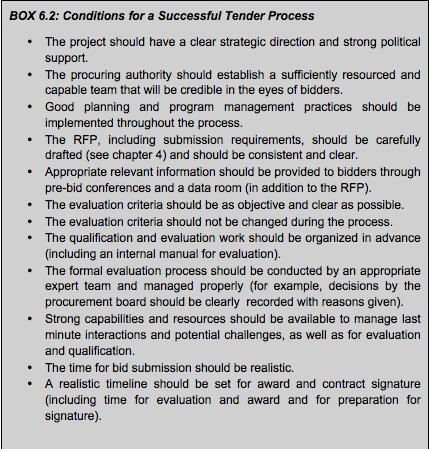Most of the features and characteristics of the tender process will be the same as in any public procurement process, but some stages and steps have specific characteristics and features. Special considerations inherent to the particular complexities of PPPs are listed below.
- Time to prepare and submit offers: This will usually be longer than in a conventional procurement. Due to the intricacies of the PPP processes (including complexities faced by the private partner), it is essential to grant the bidders sufficient time for proper due diligence, analysis, and assessment of the project and the contract from different fronts. This is discussed in section 5.
- Interaction with the market/bidders: As explained in previous chapters, an initial interaction/communication process should be carried out before the tender launch occurs. However, some interaction should also take place during the tender process to better inform bidders about the project, and to clarify potential inconsistencies or amend unintended errors in the wording of the RFP and the contract (see section 6). In some countries, more extensive interaction occurs (this is discussed in section 8). A balance needs to be found so as not to endanger the legality of the process and potentially suffer a challenge that may paralyze the process or require the government to re-issue the tender.
- Risks of challenges to the process: Due to the incremental complexity of the contract and process, the risk of a challenge is considered higher in PPPs than in a conventional procurement. In addition to the possibility of a challenge by an unsuccessful bidder, in some countries it may be possible under administrative law for the wider public and civil organizations to challenge the process if their interests conflict with the nature and objectives of the PPP. There may also be non-legal routes to challenge the process (for example, by applying political pressure). Some bidders may be willing to force a project cancellation because they may not be ready enough to participate (which links to the first concern expressed above about allowing sufficient time to bid). The risk may be exacerbated in countries in which both the public and private sectors lack PPP experience. As such, there are no shared expectations as to how the process will unfold. Management of challenges to the process are discussed in section 11.
- Time for evaluation: Evaluating PPP bids is a more complex matter than evaluating conventional contracts. PPP evaluation requires knowledge of both the PPP’s technical and financial features, including the particularities of the technical proposal and how it interacts with the financial sustainability of the offer.
The room for potential non-compliance with the proposal requirements is significantly larger than in a conventional procurement.
Linked with the higher risk of challenges is also a need to be accurate and stick with the rules and methodology for bid evaluation (and selection/qualification) as described in the RFP (section 9. discusses the practicalities of evaluation management).
- Contract signature or commercial close[2]. Prior conditions: In a PPP, management of the contract signature process is more demanding for both the public and private parties. A longer period is required to allow the private partner, as awardee, to prepare for signature, especially (in some jurisdictions) the need to form a special purpose vehicle (SPV) that will sign the contract.
There are usually some other prior requirements for contract signature, such as contracting (or booking) insurance and providing definitive bonds or guarantees (in lieu of the bid bond). In some cases, the financial model must be audited prior to contract signature, while in other cases this may be delayed until financial close (for those contracts that allow for arranging finance after the contact signature). Section 11 explains these issues further.
Taking into consideration those special features of a PPP tender process, the box 6.2 proposes a list of conditions to be met or areas of specific care when preparing and conducting a tender process.

[2] “Commercial close” is another term for contract signature.


Add a comment